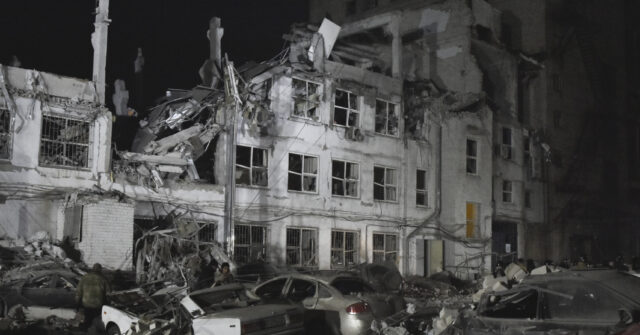In a harrowing incident in Zaporizhzhia, Ukraine, rescue crews worked tirelessly through the night to save two women trapped under the rubble of a private medical clinic that was hit by a Russian missile. The attack, which occurred late Tuesday, resulted in eight fatalities and left 22 others injured. The women, who managed to call for help using their cellphones, exemplified the desperate circumstances faced by civilians caught in the ongoing conflict. This event underscores the persistent threat that missile strikes pose to civilian infrastructure as the war, nearing its third year, continues unabated.
The escalation of Russian attacks on civilian areas highlights the urgent need for enhanced air defense capabilities in Ukraine, a sentiment echoed by President Volodymyr Zelenskyy. Following the deadly strike in Zaporizhzhia, Zelenskyy urged Ukraine’s Western allies to provide more military support, specifically advanced air defense systems. He pointed out that while Ukraine is doing its best to fend off attacks, the available resources are insufficient to protect the country effectively. The president stressed that Western nations possess systems that could significantly bolster Ukraine’s defense capabilities and save lives, thereby calling for action rather than inaction.
As the conflict rages on, Ukraine is not only on the defensive but also actively engaging in long-range strikes against Russian targets. Ukrainian forces targeted an industrial facility in Russia’s Bryansk region using drone strikes, resulting in a significant fire, according to local officials. Additionally, missile strikes in the Rostov region damaged infrastructure, further demonstrating Ukraine’s intent to strike back at military facilities that support Russian operations. These counterattacks are part of a broader strategy by Ukraine to retaliate against aggression and disrupt the logistical support system of Russian military efforts.
President Zelenskyy expressed gratitude towards the Ukrainian forces for their tactical successes in striking Russian military and energy facilities. He emphasized the importance of such operations in shifting the balance of the conflict and pressuring Russia to reconsider its aggressive posture. By delivering precise long-range attacks, Ukraine aims to challenge the Kremlin’s perception of the war and convey that continued conflict will only lead to further detrimental consequences for Russia. Zelenskyy articulated a vision of bringing Russia back to the negotiating table, advocating for an end to the hostilities through demonstrated military efficacy.
The ongoing warfare between Russia and Ukraine encapsulates a cycle of violence that has resulted in a tragic loss of life and continued suffering for civilians. The distressing outcomes of missile strikes on non-military targets raise critical questions about the ethics of warfare and the responsibilities of countries engaged in conflict. As Ukrainian cities face recurrent bombardment, the international community is left grappling with how best to support Ukraine while addressing the broader implications of escalated military engagements across Europe. The underlying need for a sustainable peace is increasingly vital as the human toll of the war mounts.
In summary, the harrowing events in Zaporizhzhia serve as a tragic reminder of the ongoing conflict and the critical need for international support for Ukraine. As President Zelenskyy pleads for timely assistance and more robust air defense systems, the stakes of the war become ever clearer. The reciprocal assaults underscore the urgency for both sides to seek resolutions that could prevent further suffering and loss of life. The path forward lies not only in military resilience but also in concerted diplomatic efforts aimed at bringing about an end to hostilities and ensuring the safety of civilian populations in the region.

